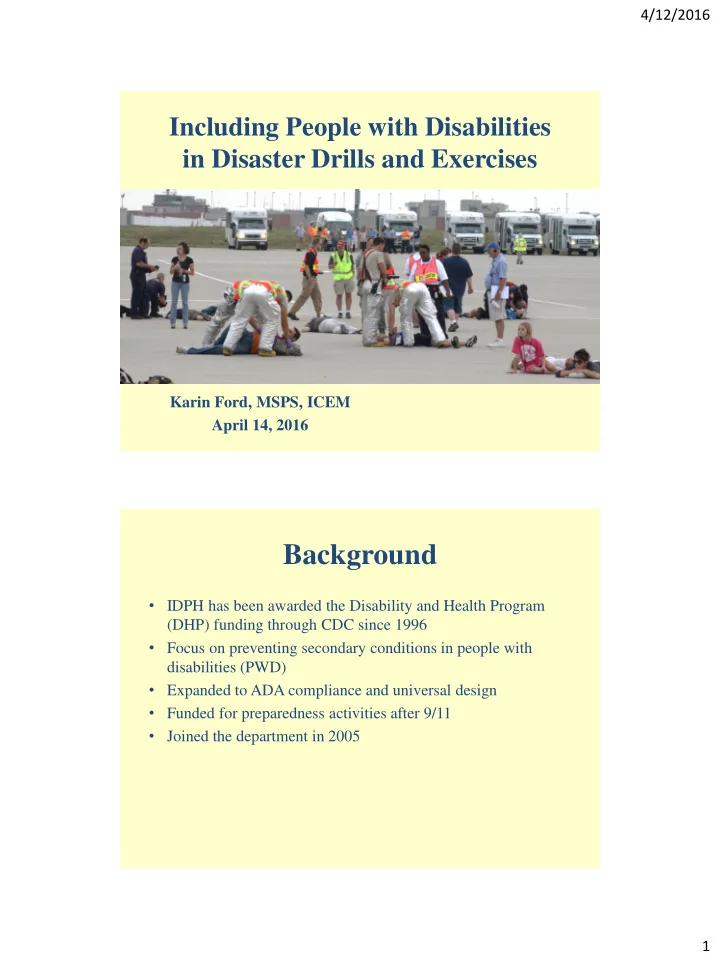

4/12/2016 Including People with Disabilities in Disaster Drills and Exercises Karin Ford, MSPS, ICEM April 14, 2016 Background • IDPH has been awarded the Disability and Health Program (DHP) funding through CDC since 1996 • Focus on preventing secondary conditions in people with disabilities (PWD) • Expanded to ADA compliance and universal design • Funded for preparedness activities after 9/11 • Joined the department in 2005 1
4/12/2016 My Background • 20 years social work • Disability expertize • ADA expertize • Emergency response • Planner • Blended all together = accessible sheltering Photo courtesy of FEMA/Patsy Lynch Grant Activities • Main focus on individual preparedness • Difficult to measure progress or success • Large scale disasters potentially could eliminate personal planning • Preparedness evolved into Whole Community Planning • Expanding the planning process to inclusive and accessible 2
4/12/2016 Current Grant Activities Target: Promote State participation of people with disabilities in emergency planning and exercise planning Activities: Promote the inclusion of people with disabilities and their caregivers, attendants or other key support people in emergency preparedness training and education exercises. • Participated in 2012 and 2016 Des Moines International Airport Exercise • Provided technical assistance on exercise planning, identifying participants, evaluator Des Moines International Airport • FAA requires full scale exercise for the airport to maintain its license/certification to operate, every three years • Scenario for each is a simulated passenger air plane crash 3
4/12/2016 Purpose for Exercise • Test and evaluate the Des Moines International Airport Emergency Plan (AEP) and capabilities • Included state, county, and local emergency responders • Local hospitals and county medical examiner • Public, private entities and service providers Exercise Participants • Full Scale Exercise held on August 4 th , 2012 • 351 people participated – 110 actors • 6 PWD participated, including developmental, mobility, low to no hearing and communication disabilities • Full Scale Exercise held on August 8, 2015 • Over 300 people participated – 152 actors • 8 PWD participated, including mobility, developmental disability, mental health and low to no hearing 4
4/12/2016 Exercise Participants 2015 exercise • 2 Federal agencies • 2 State agencies • 2 county agencies • 8 municipal agencies • 8 hospitals • 2 public entities • 3 private entities Hotwash • Polk County Emergency Management (PCEM) hosted a hotwash after both exercises • Responders struggled with responding to the PWD/actors • Questioned if PWD would even be on a plane • Had little understanding how to communicate or assist with evacuating them from the crash site • Left power wheel chair outside during rain delay • Responders spoke to care givers, not PWD/actors • Did not secure crash site from PWD/actors 5
4/12/2016 Hotwash • Overhead announcements were not provided in alternate method • Low to no vision not addressed • Some responders believed PWD with power chairs would not be on a plane • Blurred response from day to day disaster to major event • Meaning, they went into “get them to the hospital” my piece is done • In large scale events, infrastructure may not be in place • The exercise provided a different way to look at response Outcomes • Had a candid discussion about PWD living independent • Importance of assistive technology and how it needs to be evacuated with the person • Ask what assistance PWD need • Responders agreed that they needed training on how to communicate more effectively with PWD • Provided recommendations for training and modifications to plans • All players need instruction on their role in the exercise 6
4/12/2016 Disability Experience • Better understanding of the role of emergency management • Better understanding what their personal role is in preparedness • Non-injured PWD/actors reported that transportation partners were knowledgeable, felt comfortable and safe Partnerships • PCEM has worked extensively with the DHP on inclusive disaster planning, response and recovery • PCEM also has an established partnership with LINK Associates; a greater Des Moines community based non-profit organization that provides support services to adults with developmental disabilities and their families • This partnership includes a robust accessible transportation capability which has been activated several times in the past few years for evacuation purposes for fires and flooding 7
4/12/2016 Possible Opportunities for Participation in a Disaster Exercise • County emergency managers and planners • Airport exercise • Academic institutions • Hospitals, care facilities • Providers • Events centers Your Role Evaluators • Observe and document performance against established capability targets and critical tasks • Evaluate and provide feedback on a designated functional area of the exercise • You are a SME in disability and hold desirable expertise to the exercise • Volunteer as an evaluators • Come to the table to solve problems 8
4/12/2016 Partnerships for Emergency Managers and Planners • Local, county and state public health • Area on Aging • Easter Seals • Disability councils, boards and commissions • Disability providers • Direct care providers • Local VOAD • If you don’t know where to start, contact me Contact Jon Davis, Deputy Director, PCEM Jon.Davis@polkcountyiowa.gov 515-286-2107 9
4/12/2016 Questions/Comments Karin Ford, MSPS, ICEM Iowa Department of Public Health 515-242-6336 Karin.Ford@idph.iowa.gov 10
Recommend
More recommend